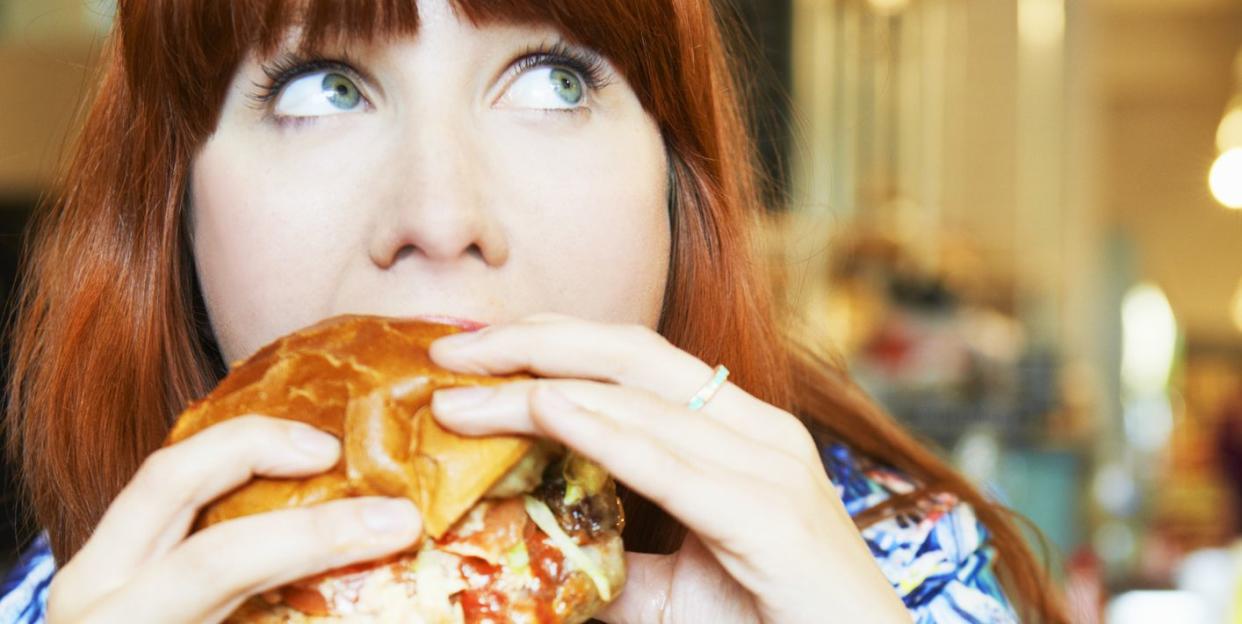Feeling bloated after a big night out?

Even for those of you with the noblest intentions and the steeliest mid-week willpower, by the time the weekend rolls around if you've had a tough week it can be all too easy to order a burger, extra fries and a tub of ice cream to relax.
Everyone knows it's best to consume moderate portions, pass on seconds, stand away from the buffet table, and stop eating when you feel satisfied. But it's perfectly OK to overindulge every once in a while and no harm will come to you from enjoying the occasional burger feast.
However, if you're feeling sluggish after an evening, a weekend, or even a fortnight of eating and drinking to excess, follow these tips to help get yourself back on track:
1.Don't beat yourself up
Firstly and most importantly, don't beat yourself up if you fall into the temptation of splurging. Remember that it's what you eat on a regular basis that affects your long term health, not a treat meal or a night on the tiles after a tough working week. Occasional overindulgence is not a health problem and should be enjoyed without regret.
2. Try not to skip meals
Resist the temptation to try to make up for the extra calories by skipping meals the next day. This will just leave you feeling hungry and miserable, and likely to indulge again. Instead eat smaller, lighter meals packed with fruit and vegetables and some lean protein such as fish, chicken, beans or tofu.
3. Side-step the scales
After a weekend of fine dining or a holiday you are likely to weigh a bit more. This isn't because you've gained body fat, but because you've retained water due to the extra salt you've consumed. Stay away from the scales, and instead focus your energy and attention on the steps you're taking to get your healthy eating back on track.
4. Love your liver
The liver is responsible for detoxifying alcohol, metabolising fats, and cleansing the body of toxins, and if you overindulge for a period it may have to work a little harder than usual! Supporting the function of the liver can be a very powerful way to give the body a cleanse, and you can do this by packing your diet with liver-supportive foods.
✔️ Try this: cruciferous vegetables (broccoli, cauliflower, kale and cabbage), lemon, beetroot, eggs and turmeric all contain compounds that aid liver function.
5. Drink lots of water
If you've been out or a slap up meal or two and you have a sore head, staying well hydrated is something that can often be neglected. The consequences of this are widespread, with dehydration manifesting in many forms including low mood, poor energy levels and a sluggish digestive system. Water is also important for ridding the body of toxins, and supporting the liver in processing foods. To rehydrate properly, don't be tempted just to knock back a large pint of water and then forget about it. Instead, sip water regularly over the course of the day.
6. Rebalance your gut
If you normally stick to a healthy diet, an excess of sugar and alcohol can be a shock for even the most robust of digestive systems. By providing a food source for the "bad" bacteria, over consumption can lead to an imbalance in the gut bacteria that can result in bloating and troublesome tums.
❤️ Try probiotics
Increasing your intake of probiotics can help redress the balance. Probiotics are living microorganisms that, when ingested, provide numerous health benefits as they help rebalance our gut bacteria. Probiotics are usually bacteria but can also be types of yeasts. Probiotics can be from supplements or foods such as yoghurt, kefir, sauerkraut, tempeh and kimchi. These foods have been prepared by bacterial fermentation.
❤️ Don't forget prebiotics
You can also improve the amount of "friendly" bacteria in your gut through diet by increasing your intake of prebiotic foods. Prebiotics are types of fibre that the friendly bacteria in your gut feed on. They then help the good bacteria produce nutrients for your colon cells and digestive system and have a very beneficial effect on your overall health. Prebiotic foods include onions, garlic, leeks, asparagus, oats, Jerusalem artichoke, bananas, apples.
Last updated: 06-02-2020
You Might Also Like

